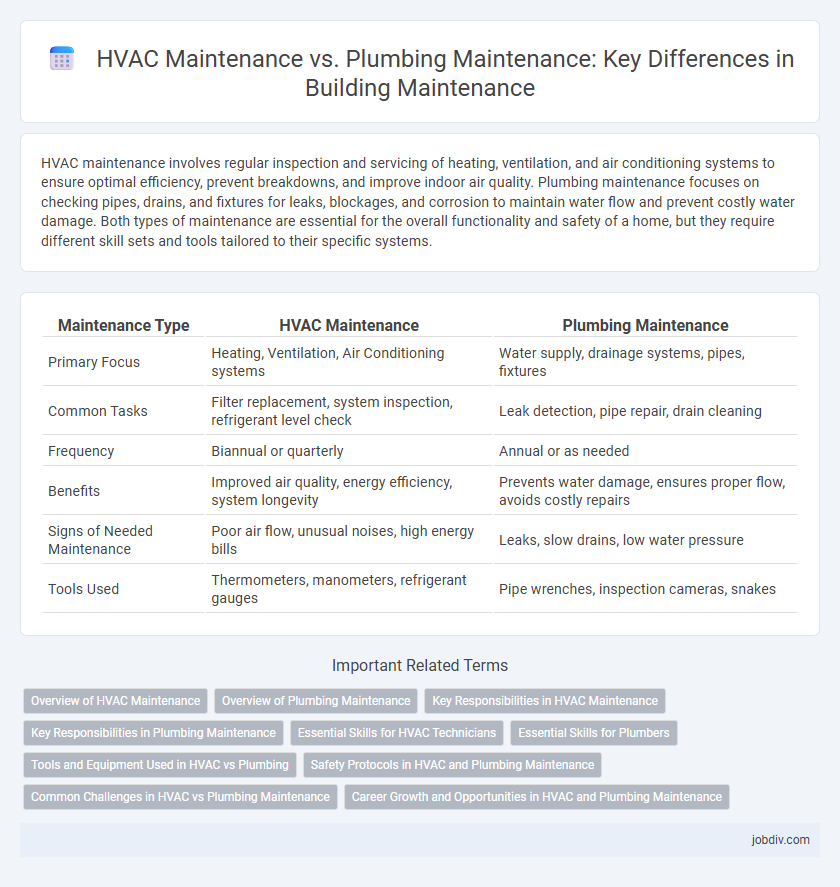HVAC maintenance involves regular inspection and servicing of heating, ventilation, and air conditioning systems to ensure optimal efficiency, prevent breakdowns, and improve indoor air quality. Plumbing maintenance focuses on checking pipes, drains, and fixtures for leaks, blockages, and corrosion to maintain water flow and prevent costly water damage. Both types of maintenance are essential for the overall functionality and safety of a home, but they require different skill sets and tools tailored to their specific systems.
Table of Comparison
| Maintenance Type | HVAC Maintenance | Plumbing Maintenance |
|---|---|---|
| Primary Focus | Heating, Ventilation, Air Conditioning systems | Water supply, drainage systems, pipes, fixtures |
| Common Tasks | Filter replacement, system inspection, refrigerant level check | Leak detection, pipe repair, drain cleaning |
| Frequency | Biannual or quarterly | Annual or as needed |
| Benefits | Improved air quality, energy efficiency, system longevity | Prevents water damage, ensures proper flow, avoids costly repairs |
| Signs of Needed Maintenance | Poor air flow, unusual noises, high energy bills | Leaks, slow drains, low water pressure |
| Tools Used | Thermometers, manometers, refrigerant gauges | Pipe wrenches, inspection cameras, snakes |
Overview of HVAC Maintenance
HVAC maintenance involves regular inspection, cleaning, and servicing of heating, ventilation, and air conditioning systems to ensure optimal performance and energy efficiency. Key tasks include checking refrigerant levels, replacing air filters, inspecting ductwork, and testing thermostat functionality. Proper HVAC maintenance reduces the risk of system breakdowns, improves indoor air quality, and extends equipment lifespan.
Overview of Plumbing Maintenance
Plumbing maintenance involves regular inspection, cleaning, and repair of pipes, fixtures, and drains to prevent leaks and blockages, ensuring efficient water flow and system longevity. Routine tasks include checking for corrosion, replacing worn-out seals, and clearing clogged drains to avoid costly water damage and health hazards. Effective plumbing maintenance reduces emergency repairs and enhances overall home safety compared to HVAC maintenance, which centers primarily on heating, ventilation, and air conditioning systems.
Key Responsibilities in HVAC Maintenance
HVAC maintenance primarily involves inspecting and servicing heating, ventilation, and air conditioning systems to ensure optimal performance and energy efficiency. Key responsibilities include cleaning and replacing air filters, checking refrigerant levels, inspecting ductwork for leaks, and testing electrical components to prevent system failures. Regular HVAC maintenance also involves calibrating thermostats and performing safety checks to avoid hazardous conditions like carbon monoxide leaks.
Key Responsibilities in Plumbing Maintenance
Plumbing maintenance involves inspecting and repairing pipes, fixtures, and drainage systems to prevent leaks, blockages, and water damage. Key responsibilities include ensuring proper water flow, maintaining backflow prevention devices, and regularly servicing water heaters and sump pumps. This contrasts HVAC maintenance, which primarily focuses on heating, ventilation, and air conditioning system performance and air quality.
Essential Skills for HVAC Technicians
HVAC maintenance requires technicians to master skills such as system diagnostics, refrigerant handling, and airflow optimization to ensure efficient heating, ventilation, and air conditioning performance. Plumbing maintenance focuses on pipe repair, leak detection, and water system management, which differ significantly from HVAC-specific technical knowledge. Proficiency in HVAC software tools, electrical wiring, and thermodynamics sets HVAC technicians apart by enabling precise troubleshooting and system calibration.
Essential Skills for Plumbers
Plumbers require essential skills such as pipe fitting, leak detection, and knowledge of water supply systems to perform effective plumbing maintenance. Unlike HVAC maintenance, which focuses on heating, ventilation, and air conditioning systems, plumbing maintenance involves ensuring proper drainage, preventing pipe corrosion, and repairing fixtures. Mastery of these skills is critical for maintaining a safe and efficient plumbing system in residential and commercial properties.
Tools and Equipment Used in HVAC vs Plumbing
HVAC maintenance relies heavily on specialized tools such as refrigerant gauges, vacuum pumps, and thermal imaging cameras to diagnose and repair heating and cooling systems efficiently. Plumbing maintenance utilizes pipe wrenches, augers, and pressure gauges to address water flow issues, leaks, and blockages in pipes and fixtures. The distinct tools reflect the different technical requirements and materials involved in HVAC versus plumbing system upkeep.
Safety Protocols in HVAC and Plumbing Maintenance
HVAC maintenance requires strict adherence to safety protocols such as regular inspection of electrical components, proper handling of refrigerants, and monitoring ventilation to prevent carbon monoxide leaks. Plumbing maintenance focuses on preventing water damage and mold by ensuring pipe integrity, checking for leaks, and maintaining proper sewage flow according to safety standards. Both require the use of personal protective equipment (PPE) and compliance with local building codes to minimize hazards and ensure safe operation.
Common Challenges in HVAC vs Plumbing Maintenance
Common challenges in HVAC maintenance include managing refrigerant leaks, ensuring proper airflow, and maintaining system efficiency through regular filter changes and coil cleaning. Plumbing maintenance often encounters issues such as pipe leaks, clogged drains, and water pressure inconsistencies requiring timely detection and repair. Both systems demand routine inspections and preventive measures to avoid costly breakdowns and ensure operational reliability.
Career Growth and Opportunities in HVAC and Plumbing Maintenance
HVAC maintenance offers robust career growth with advanced certifications like EPA 608 and opportunities in commercial, residential, and industrial sectors, often commanding higher wages due to specialized skills in heating, ventilation, and air conditioning systems. Plumbing maintenance careers present steady demand fueled by infrastructure development and repair needs, with certifications such as Journeyman or Master Plumber enhancing job prospects and potential for self-employment. Both fields provide pathways to supervisory roles and entrepreneurship, but HVAC maintenance typically aligns with faster technological advancements and expanding green energy markets, driving broader career opportunities.
HVAC Maintenance vs Plumbing Maintenance Infographic

 jobdiv.com
jobdiv.com